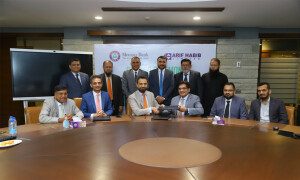Minimum tax regime for IT companies: effective tax rate to range from 94 percent to 188 percent: P@SHA
The effective tax rate on IT services companies under the new regime (8 percent minimum tax on service providers) will now range between 94 percent and 188 percent against normal corporate tax rate of 32 percent, reflecting a serious anomaly that will mar the development in rapidly growing IT sector.
According to a communication of Pakistan Software Houses Association for IT and ITES (P@SHA) to Finance Minister Ishaq Dar here on Wednesday, the government has imposed an 8 percent minimum withholding tax on services effective from 1 July 2015. The industry is compelled to implore that the levy has disastrous effect not only on the IT industry but also to technology in Pakistan. It is appreciated that the government had been promoting IT technology through many initiatives at the federal and provincial levels in the past two years but the imposition of minimum tax will undo much of what has been achieved for innovation in Pakistan.
The imposition of the minimum tax will arrest the momentum and undo much great done by so many people. Many of these start-ups do not plan for profitability in the short-term. In Pakistan, many e-commerce businesses are now working with no plans to be profitable for the next 3 to 5 years. If Minimum Revenue Tax is imposed on them, these service companies will be required to pay this tax from their capital. Thus, this will reduce the incentive for investors, both local and international to continue their support in IT sector, and, it will be a great failure for the country to see such a promising sector being dis-installed by ill-advised taxation schemes.
Thus, the effective tax rate under the new regime will now range between 94% and 188 percent, as opposed to the normal corporate tax rate of 32%. This indeed is a very serious anomaly in the new tax regime must be quickly addressed. The Minimum Tax is unjust, counter-intuitive, against the principle of free market and contrary to practices of the better market places in the world. Furthermore, it wilt have disastrous effects on the development of technology and innovation in the country rendering many business models unviable thereby squeezing the sector unemployment. It is pleaded to delete it from the Finance Act 2015 and the export income tax exemption window be extended till 2026.
Sharing its impact on IT services companies (providing services in Pakistan), it said that in the challenging economic conditions prevailing in the world markets, the leading in the Technology Services sectors average below 15 percent (Accenture the global technology leader in the industry reported a net margin of around 15 percent over the past 2 years. In Pakistan, net profit margins of the leading IT Services companies may be even less than 10 percent. even in the case of extremely well-run IT service companies in Pakistan that earn 10% net margin from services provided in Pakistan, an 8 percent Minimum Tax results in an effective Income Tax rate of 80 percent - that is, 80 percent of profits earned are to be paid by IT Services companies as taxes. For companies who operate at below 10 percent net margin, and there will be many, the operations will become unsustainable and they will be forced closure of businesses in this sector.
IT Sector will take a nosedive and will seriously hurt the economic development and employment. It has also discussed the impact of tax on Business Process Outsourcing (BPO) Companies (Providing Services in Pakistan). By definition the BPO business model depends on high-volume of man-hours of services provided but at a much lower gross margin that other professional services. Globally speaking, well run BPO businesses are expected to have turnover ranging between 8 percent to 12 percent as their net margin before taxes. For example, a global leader in the call center outsourcing business currently operates at a Net Margin before taxes of 9 percent over the past three years. In Pakistan, many BPO providers are operating at even below 8 percent net margin and with large volumes of business to sustain well maintained operations. Given the ever rising inflationary costs mainly due to high cost energy, the imposition of 8 percent Minimum Tax will render the local BPO business model unviable and this will likely result in a catastrophic collapse of the industry leading to the loss of livelihood for many individual working in BPO companies. Furthermore, it will destroy years of hard work and development that the BPO sector has accomplished in positioning Pakistan as a potential BPO supplier, it added.

























Comments
Comments are closed.